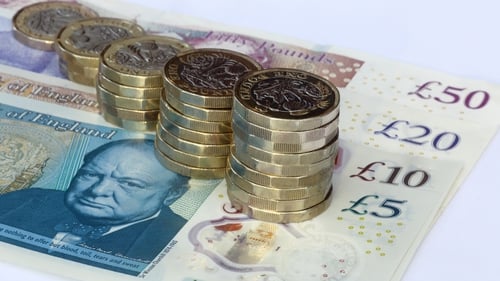The pound rose to its highest in almost three months against the U.S. dollar on Tuesday ahead of the UK government's budget this week, largely as the greenback came under fire.
As investors assessed the likely outlook for U.S. interest rates, sterling rose by as much as 1% against the dollar to its highest since late August, while the greenback fell against a raft of other currencies, including the euro and Australian and New Zealand dollars.
A cooler read of U.S. inflation last week has prompted investors to factor in the possibility of U.S. interest rates rising more slowly, which in turn, reduces the dollar's appeal to yield-hungry overseas buyers.
"Today is more about the high-beta currencies against the dollar making hay while the sun shines," CIBC Capital Markets head of G10 currency strategy Jeremy Stretch said. Newly appointed UK finance minister Jeremy Hunt will deliver his autumn budget on Thursday, which is expected to contain a raft of measures, including tax rises and spending cuts, aimed at closing a 50-billion pound ($59 billion) gap in Britain's finances.
Hunt, together with Prime Minister Rishi Sunak, has been keen to persuade markets of the government's fiscal prudence and will be keen to avoid the torrent of volatility that his predecessor, Liz Truss, unleashed with her own fiscal plan in late September.
The pound was last up 1% against the dollar at $1.18785, while against the euro it was up 0.1% at 87.74 pence. "We do have the fiscal statement coming and that is going to be a sea of negativity. Although, having said that, with the degree of policy tightening, the debate is going to be how much of it is going to be coming in the next year or two and how much is going to be pushed towards the next parliament rather than this one," Stretch said.
Sterling, which has lost over 12% in value against the dollar this year, has risen 3% so far in November, on course for its largest monthly gain since July 2020, when the economy began to reopen after a first round of pandemic lockdowns.
Futures markets show investors are attaching a 60% chance of the Bank of England, headed by Governor Andrew Bailey, raising interest rates by 50 basis points in December, and a near-40% chance of a 75-bp increase.
Data on Tuesday showed Britain's unemployment rate rose to 3.6% in the three months to September and vacancies fell for a fifth time in a row as employers worried about the outlook for the economy, the Office for National Statistics said on Tuesday.
Economists polled by Reuters had expected the jobless rate to remain at 3.5%.
Meanwhile, average weekly earnings excluding bonuses rose by 5.7% in the three months to September, above expectations for an increase of 5.5% and their fastest pace since the three months to August 2021.
However, with data on Wednesday expected to show consumer prices rose by 10.7% in October, wages are a long way off keeping pace with inflation - another factor dragging on UK economic growth.










